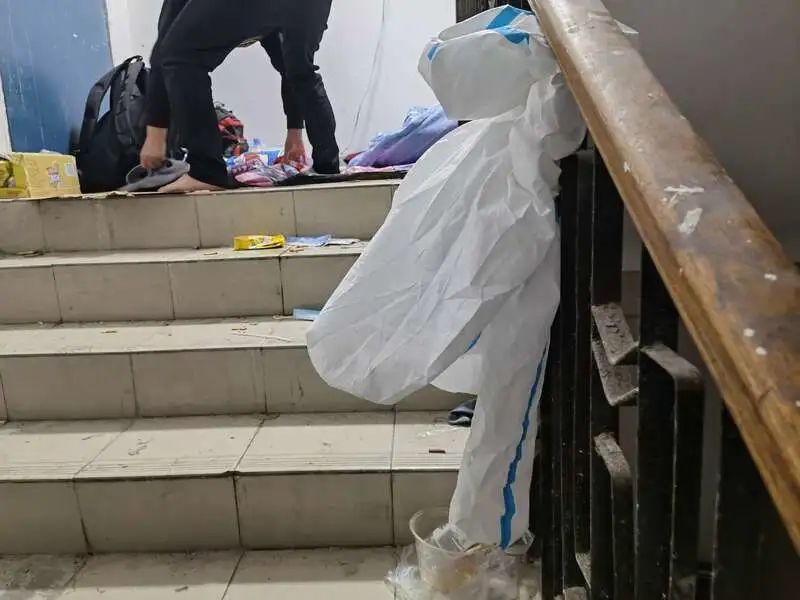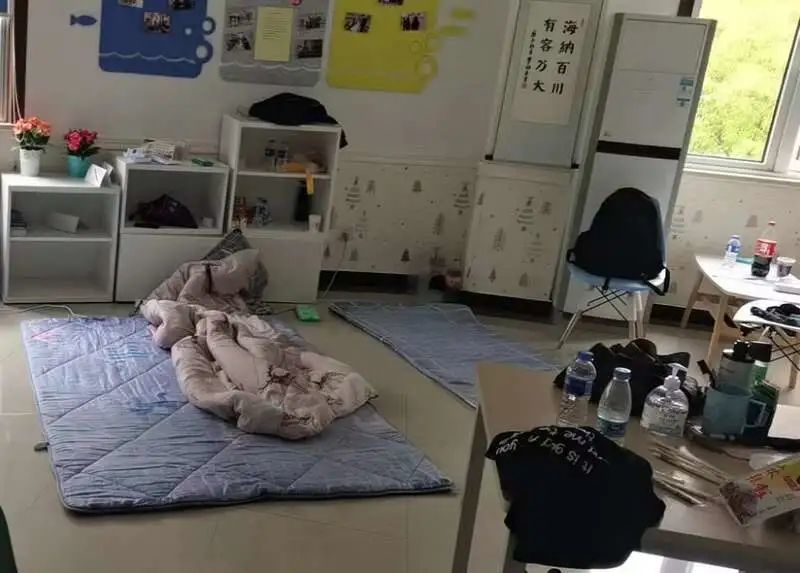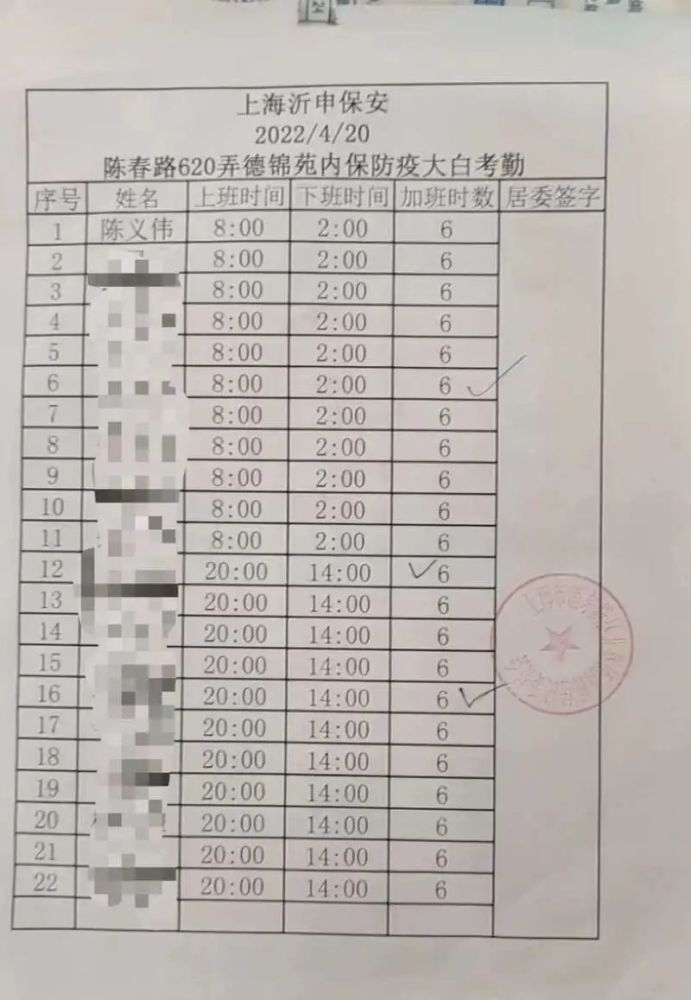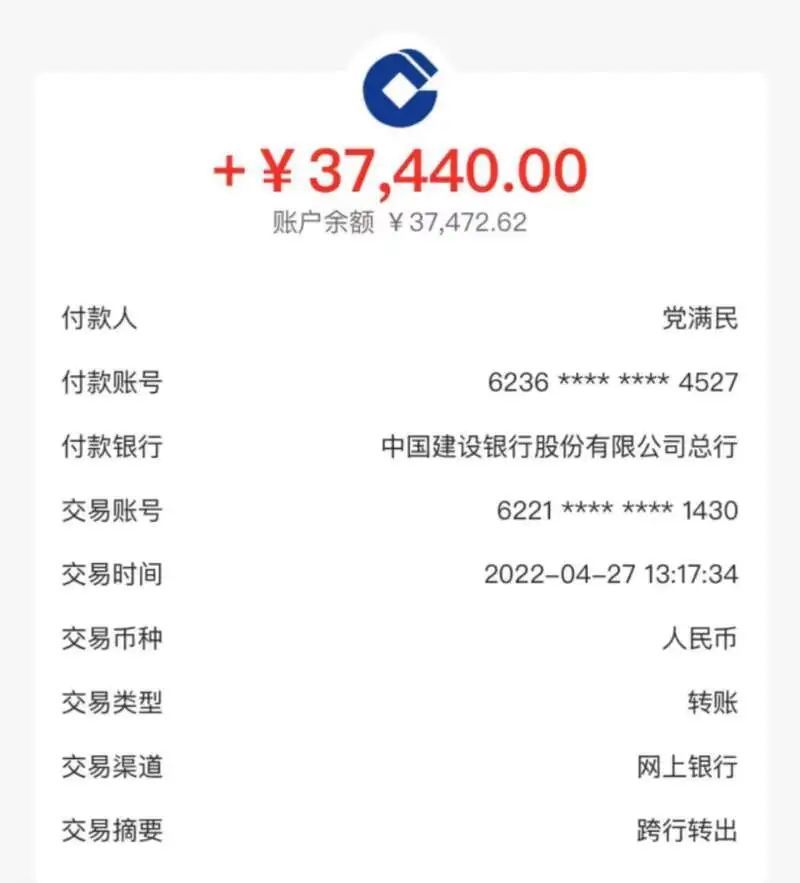Seventeen epidemic prevention security guards in Shanghai were cheated in their job applications, and now they spend the night under the bridge and in the corridor.

On April 30th, Ma Jiangming took off his protective clothing and rested in the safe passage of a shopping mall in Pudong New Area. Zhongqingbao Zhongqingwang reporter Yan Xueqing/photo
According to the WeChat news of Freezing Point Weekly, on April 28th, 17 "Epidemic Prevention Dabai" in Shanghai were forced to leave Dejinyuan Community in Pudong New Area after receiving wages and subsidies that had been owed for nearly one month. That night, the rain cooled in Shanghai, and they slept under a bridge in a nearby park.
"Epidemic Prevention" is their standard title on the local official attendance sheet. For more than a month, they didn’t know how to define their identity. Nominally, they are called "volunteers" by residents and residents’ committee staff. In fact, they are "migrant workers" in the prevention and control of COVID-19 epidemic in Shanghai, and they are recruited as "epidemic prevention security guards" through security companies and intermediaries.
A number of security guards reported to the reporter of China Youth Daily and China Youth Network that they had encountered problems such as "deceptive recruitment", loss of team leader, and arrears of salary subsidies.
be cheated
More than 10 interviewed players thought they were cheated to Dejinyuan Community.
Zhang lei used to work in Baoshan District, Shanghai. After the outbreak of the epidemic, the factory stopped working. He saw an intermediary named "Yang" posting job information in the recruitment group.
The recruitment information requires that there must be a nucleic acid certificate within 48 hours, and the site management arrangement must be obeyed, so that the community can be unsealed. The conditions are: 250 yuan/day, 12-hour accommodation, and salary settlement. The work address only says "Community near Beicai Town, Pudong New Area".
Zhang lei said that the working hours promised by the intermediary at that time were 3 to 15 days.
Similar recruitment information appeared in large numbers after the outbreak. The reporter saw in a number of Shanghai recruitment groups and odd jobs that in late April, the recruitment information was still maintained at dozens of posts every day, mostly involving epidemic situations: epidemic prevention and security, cleaning, killing team members, volunteers for epidemic control, group buying WeChat group business promoters, and secret transfer security guards.
The so-called "inner perimeter" refers to working in the sealed control area. Zhang lei called specifically to ask whether there were positive infected people in the work area. The other party said that "there is no positive, only secret connection" and asked him for his name and mobile phone number to complete the registration.
Zhang lei bluntly said that he cares about whether there are positive people because they can’t stand the lost working hours after isolation.
"We are migrant workers, and we really came out to work during the epidemic to make money." Zhang lei said that they work in the factory, and the nature of their work is odd jobs. They rarely sign full-time contracts, and they are basically converted into "hourly jobs" through labor agencies, which means that once they stop working, they have no income.
"But the mortgage in our hometown has not stopped, and the elderly and children are waiting to raise, and there are many expenses." Zhang lei said that they can’t be idle.
Ma Jiangming is also concerned about whether there are positive infected people in the workplace when applying for the job. In February of this year, he just came to Shanghai from other places to work, and he heard that Beicai had rushed over to recruit workers.
On March 22nd, Zhang lei and other five people arrived at their residence-Chen Qiao Neighborhood Committee of Beicai Town in Dejinyuan Community. At this time, they learned that Dejinyuan had positive infections in mid-March, and some of them had not yet been transported.
At this point, they can’t actually leave, either wear protective clothing to work or stay in the closed control area. "There must be a door to go out of the community, even if it is out of the community, how to leave Pudong is also a problem."
After the intermediary sent them to the door of the community, they disappeared and the group chat was dissolved. Until now, Zhang lei didn’t know the real name of "Yang", only remembered that the other party was a "young man" and a mobile phone number belonging to Shanghai.
By the end of March, a total of 22 people had stayed in Dejinyuan Community, becoming "the white of internal insurance and epidemic prevention". They live in an activity room on the second floor of Chen Qiao residents’ committee. There is only one spring bed, and the other 21 people play on the floor.

The residence of Dejinyuan "Epidemic Prevention Dabai" in Chen Qiao Neighborhood Committee. Photo courtesy of respondents
Their task in Dejinyuan is to maintain the order of the positive building and nucleic acid detection in the community, dissuade residents who try to get out of the building, and send safeguard materials to the door of the positive infected person.
In the first two weeks, they have to deal with the diverse needs of residents in the community. In the eyes of residents, they are not ordinary migrant workers. "Those of us who wear protective clothing are the nearest epidemic prevention workers".
"At that time, the residents of the community were also very difficult. In addition to making money, everyone wanted to help the trapped residents do something." Team member Zhang Changshun told reporters that he was one of the first people who came to support the community on March 18th. He used to be a security guard in a nearby community and was temporarily transferred to Dejinyuan.
go missing
The salary first went wrong in early April.
The salary of more than 200 yuan for 12 hours is not high in Shanghai. Zhang Changshun said that his original security salary was more than 200 yuan a day, but it was higher than usual to be able to work "even shifts" during the epidemic.
"Working overtime" means going to work day and night. For example, the reporter saw that a recruitment information directly stated that "working overtime" was allowed, 12 hours /200 yuan, 24 hours/400 yuan and 48 hours/800 yuan.
Zhang Changshun, Ma Jiangming and others just arrived, which is called "Lian Ban". Stay on duty for 12 hours in front of the building, with a daily salary of 240-260 yuan; 24 hours on the job, double it. In the early days, two people were in charge of a building, and they could take turns to rest when they were not busy at night.
The form of "continuous shift" lasted for about a week and was cancelled. It was changed to 12 hours a day and 6 hours overtime.
On April 5th in Dejinyuan, the column of overtime hours was changed from 12 hours to 6 hours. The daily attendance sheet is stamped with the official seal of Chen Qiao Resident Committee of Beicai Town, Pudong New Area.

Attendance sheet for epidemic prevention in Dejinyuan, Yishen Security, Shanghai. Photo courtesy of respondents
"This is equivalent to reducing salary in disguise." Zhang lei said that with the outbreak of the epidemic, the number of positive buildings in the community increased. In the later period, there were 14 buildings with positive infections, and there were insufficient manpower. One person looked at two buildings. "The treatment has declined and the workload has increased."
The intermediary promised to pay wages within 15 days. Originally, their attendance and wages were the responsibility of the team leader Chen Yiwei. After Chen Yiwei delayed the issuance many times, on April 26, he suddenly lost contact.
After the news came out, some residents of Dejinyuan were worried.
As the epidemic prevention security guards went to defend their rights, the building was unattended. A resident saw his neighbor living in the closed building go out of his house, worried that the epidemic prevention achievements would be "destroyed once and there was no hope of unsealing", and called on everyone to contribute to solving the wage arrears problem of "epidemic prevention" in the community WeChat group.
"Chen Yiwei’s running must have been thought out early and premeditated." Zhang Changshun said that on April 19th, Chen Yiwei borrowed 1000 yuan money from him, saying that he needed money.
Chen Yiwei is the "biggest spender" in the team. His money is mainly used for "dumping materials" in Dejinyuan.
A number of team members said that Chen Yiwei got milk, coke, sprite, cigarettes, alcohol and other materials, and then sold them to residents and team members at high prices. This kind of materials once belonged to "rare goods" in the closed control area.
Many residents who bought materials from Chen Yiwei kept transfer records. Some residents told reporters that a bottle of alcohol with a market price of more than 40 yuan would cost more than 200 yuan from Chen Yiwei. A daily price of 110 yuan cigarettes, from Chen Yiwei’s hand to increase the price of 100 yuan.
On April 24th, the number of times that Chen Yiwei borrowed money reached a peak, and he kept borrowing money from the team members and some residents of Dejinyuan Community. According to incomplete statistics, nearly 10 players borrowed more than 9000 yuan from Chen Yiwei. The number of loans borrowed by residents is unknown.
Chen Yiwei once borrowed a battery car from Wei, a resident of the community. A team member said that he saw Chen Yiwei "running away by bike". At the same time, Chen Yiwei took away 21 players with a total living expenses of 21,000 yuan.
Since April 26, the team members have repeatedly called Chen Yiwei’s mobile phone number and WeChat, but they can’t get through. Before the press release, the reporter dialed Chen Yiwei’s mobile phone number, and the other party showed that it was turned off.
ask for help
After learning about it, some residents of Dejinyuan also spontaneously called and posted online posts for help and rights protection.
On April 27th, Zhang lei was called to the door by three strangers, who told him to stop making trouble.
Zhang lei and other team members called 12345, 12333, 12348 and other hotlines to report and reported to the police.
After the intervention of Beicai Town Government, two staff members who claimed to be Shanghai Yishen Security Company came to negotiate with them to pay the arrears of wages. One is called Dang Man Min, and the other is Zhuo.
Party Manchu paid 21 epidemic prevention security guards the salary and overtime allowance before April 26th, calculated as 18 hours per day, and asked them to remain on duty.

The players were divided into several groups and received wages and subsidies from the party and the people. Photo courtesy of respondents
They are worried about future problems and hope to sign a written employment agreement. On the evening of April 28th, a new captain came to the community, saying that new personnel would join in and asked the original epidemic prevention security guards to make room. In the end, 17 members including Ma Jiangming left Dejinyuan Community in the rain.
On May 1st, a person in charge of the Chen Qiao neighborhood committee in Beicai Town told the reporter of Zhongqingbao. com that the problems reflected by the "Great White Epidemic Prevention" had been solved, and 17 people left for "transferring posts" and "changing to other communities".
He said that it is not clear whether these "big whites" come from intermediary companies or security companies. "They are all operated from above and have nothing to do with the Jucun Committee." They are only responsible for the reception of personnel after they come in. "Other things don’t matter."
The relevant departments of Shanghai told the reporter of Zhongqing Daily and Zhongqing.com that Pudong New Area has been involved in handling this matter. The reporter asked the relevant departments of Pudong New Area, Beicai Town and Shanghai Yishen Security Company about the situation. As of press time, no response was received.
Zhang lei and others denied "post adjustment".
They can’t rest under the bridge in the park any longer. On April 29, the city management unit inspected. "I heard that someone reported us." Ma Jiang said.
Four of them found a hotel, "beds, 40 to 50 yuan per person a day". The rest are going to stay under the bridge for two days.
Ma Jiang said that it has been raining for many days in Shanghai, and it is difficult to find places where no one lives, such as bridge opening, corridors and underground garages, and so on, until you find a job.
On the evening of 29th, Zhang lei told the reporter a "good news"-he and three workmates "came out of Pudong New Area". They found a taxi with a pass through the introduction of friends with channels. From Beicai Town to Baoshan District, the whole journey is about 38 kilometers, and each person is in 300 yuan. Four people paid the driver a total of 1200 yuan.
Ma Jiangming found a new job through an intermediary. "I still do epidemic prevention and help doctors who do nucleic acid testing’ label’. "He repeatedly confirmed the information to the intermediary, and the intermediary made a guarantee," 400 yuan can have a normal rest one day and at night ".
They walked 3 kilometers to the work place and found that there was no doctor there, only an isolation point under construction. "Let’s build a shed and be cheated again."
That night, they found an underground garage in a shopping mall and planned to spend the night there. When they went inside, they found that it was occupied. There is no one on the second and third floors of the safe passage, where they make a floor and temporarily settle down.
(At the request of the respondents, Zhang lei, Ma Jiangming and Zhang Changshun are all pseudonyms.)
Original title: 17 epidemic prevention security guards in Shanghai were cheated, and now they spend the night under the bridge and in the corridor.
[Disclaimer] Manuscripts not marked with "Source: Upstream News" or "Upstream News LOGO, Watermark Text, Pictures, Audio and Video" on the upstream news client are all reposted. If the reposted manuscript involves copyright issues, pleaseContact upstream.